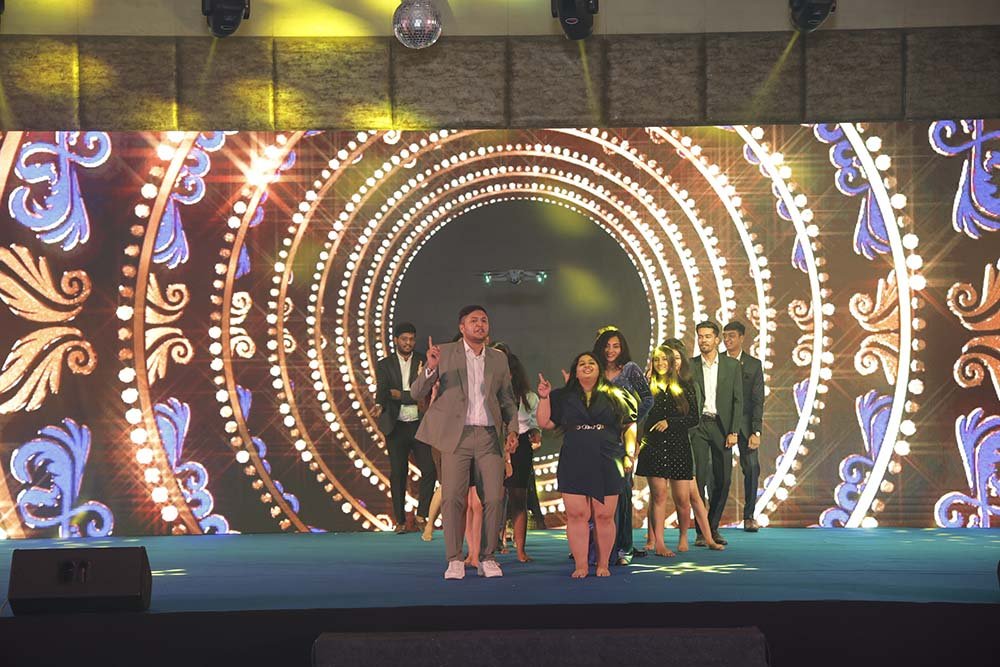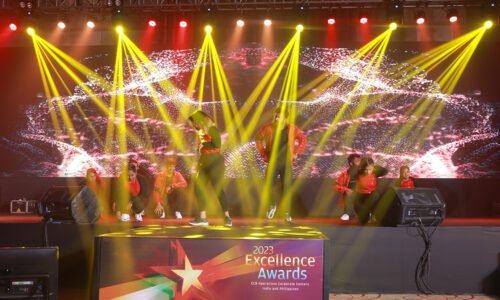
Unlock the Magic of Event Management Entertainment : All You Need to Know!
- Blog, Event Management
- October 23, 2023
Reading Time: 12 minutes

A former TOI copywriter who dabbled in sales, export and PR until he found something that was truly on-brand for him. Today, Brandmela stands tall, having introduced a wave of pioneering solutions that continue to shake up the industry.
Event management entertainment is more than just a way to keep attendees entertained – it’s a crucial element that can turn any event into an unforgettable experience. Whether you’re organizing a corporate conference, wedding, or birthday party, entertainment can elevate the atmosphere, engage guests, and create lasting memories.
From live bands and DJs to mesmerizing performers and captivating acts, event management entertainment encompasses a wide range of options that cater to different event types and audience preferences. With the right choice of entertainment, you can set the tone, enhance the ambiance, and ensure everyone leaves with a smile on their face.
In this comprehensive guide, we will delve into the essence of event management entertainment, exploring its significance, the different types of entertainment available, and essential tips to help you choose the perfect entertainment for your next event. So, get ready to unlock the magic and make your event an unforgettable one!
Management
Event management in the entertainment industry requires a unique set of skills and responsibilities. Here’s what it takes to be a successful event manager in this sector:
Key skills required for event management in the entertainment industry
- Creativity: An event manager in the entertainment sector needs to think outside the box and come up with innovative ideas to make an event truly memorable.
- Organizational skills: Managing multiple moving parts, coordinating with different vendors, and keeping everything on schedule requires exceptional organizational abilities.
- Communication: Effective communication is crucial in event management as it involves liaising with clients, entertainers, suppliers, and other stakeholders.
- Problem-solving: Event managers must be quick on their feet and capable of resolving unexpected challenges that may arise during an event.
- Attention to detail: From logistics to event design, every aspect needs to be meticulously planned and executed to ensure a seamless experience for attendees.
Responsibilities of an event manager in the entertainment sector
An event manager in the
entertainment sector wears many hats. Their responsibilities include:
- Planning and coordination: From concept development to execution, event managers are responsible for the overall planning and coordination of events.
- Budget management: They must create and stick to a budget, ensuring all expenses are accounted for and delivering the maximum value within the allocated resources.
- Vendor management: Event managers need to identify and collaborate with reliable suppliers, negotiate contracts, and ensure all vendors deliver products and services as expected.
- Attendee experience: Creating an unforgettable experience for attendees is a primary goal. Event managers need to plan the event flow, entertainment lineup, and manage any potential issues to make sure guests have a great time.
Challenges faced by event managers and how to overcome them
Event management in the entertainment industry comes with its share of challenges. Here are some common challenges and tips to overcome them:
- Tight timelines: Entertainment events often have strict timelines. To overcome this challenge, event managers need to meticulously plan every step and work with efficient suppliers.
- Unpredictable circumstances: Unexpected issues like technical glitches or performer cancellations can occur. Event managers should have backup plans for crisis management in place and maintain open communication with all stakeholders to manage unforeseen circumstances.
- Budget constraints: Limited budgets can be an obstacle, but creativity and negotiation skills can help event managers maximize resources and deliver a successful event on a tight budget.
- Coordination difficulties: Coordinating with various suppliers and entertainers can be challenging. Strong communication, organizational skills, and regular updates can help event managers streamline the coordination process.
Events
Events in the entertainment industry are diverse and exciting, offering endless opportunities for creativity and innovation. From corporate get togethers, annual days, MICE, international conferences, Rewards and Recognition, star-studded concerts to vibrant festivals and glamorous award shows, fashion shows, musical events, the world of event management entertainment never fails to captivate audiences.
Event planning and organization process for entertainment events require meticulous attention to detail. It involves curating a lineup of artists, performers, and attractions that will leave the attendees in awe. From securing the venue to managing logistics and coordinating with various stakeholders, every aspect must be flawlessly executed to create an unforgettable experience.
The importance of creativity and innovation in event design and experience cannot be overstated. In a highly competitive industry, events must constantly push the boundaries and offer something fresh and unique to stand out. From interactive installations and immersive environments to cutting-edge technology integrations, creativity is at the core of event management entertainment.
- Concerts: Live music performances featuring renowned artists and bands.
- Festivals: Large-scale events celebrating music, art, and culture, attracting a wide range of attendees.
- Award shows: Glamorous ceremonies honouring achievements in the entertainment industry.
- R n R : Rewards and recognition events
- Annual parties : Employee get-together with high level of engagement
- Partner meets : Usually dealer or distributor meets meets.
- Brand launch : These are usually announcement events where all stakeholders are invited to unveil the new launch/ relaunch .
- MICE : International events, seminars, incentive trips and exhibition conferences
Entertainment: Enhancing Event Experiences
The entertainment industry plays a crucial role in the success of any event. From music and performances to engaging activities, entertainment choices can greatly enhance the overall event experience.
Significance of Entertainment in Events
Entertainment has a significant impact on the overall ambiance and mood of an event. It sets the tone, creates excitement, and keeps the attendees engaged throughout the event. Whether it’s a corporate conference, a wedding, or a music festival, choosing the right entertainment can make the event memorable and leave a lasting impression on the guests.
Enhancing Event Experiences through Entertainment
The choice of entertainment can elevate an event and make it stand out from the rest. Interactive activities and performances not only captivate the audience but also provide a unique and immersive experience. When guests are entertained, they are more likely to enjoy the event, participate actively, and remember it for a long time.
By carefully selecting entertainment options that align with the theme and purpose of the event, organizers can create a cohesive and memorable experience for attendees.
Popular Entertainment Options for Different Types of Events
- Corporate Events: Business conferences and networking events often feature keynote speakers, live bands, and interactive activities to engage and entertain attendees.
- Weddings: Wedding ceremonies and receptions commonly include live music bands, DJs, dancers, and performers to create a joyful and celebratory atmosphere.
- Music Festivals: Music festivals typically showcase various bands, artists, and DJs across multiple stages, offering a wide range of musical genres to cater to different tastes.
- Social Events: Social events such as charity galas or fundraisers often incorporate live auctions, comedy shows, and celebrity performances to entertain guests and create a memorable experience.
Understanding the target audience and the nature of the event is crucial when selecting the appropriate entertainment options. By considering these factors, event managers can design an entertainment lineup that will captivate and engage attendees, leaving them with delightful memories of the event.
Customer
Understanding the target audience for entertainment events is essential in event management. By identifying the demographics, interests, and preferences of the intended attendees, event planners can tailor the offerings to suit their needs and expectations.
Implementing customer-centric strategies in event management involves putting the attendees at the center of the planning process. This means considering their desires and requirements in every aspect of the event, from the choice of venues and entertainment acts to the selection of food and beverages.
The importance of customer feedback and satisfaction measurement cannot be overstated. By actively seeking feedback from attendees, event planners can identify areas for improvement and enhance the overall experience for future events. Regular surveys, reviews, and ratings should be employed to gauge customer satisfaction and make informed decisions.
Planning
When it comes to event management entertainment, strategic planning plays a crucial role in ensuring its success. Proper planning allows you to outline the objectives, set budgets, allocate resources, and create a roadmap for executing a remarkable entertainment event.
Importance of strategic planning in event management entertainment
Strategic planning is the foundation of any well-executed event. It helps you define the purpose and goals of the entertainment event, whether it’s a concert, festival, or corporate gathering. With a clear plan in place, you can effectively organize and coordinate various aspects of the event, such as venue selection, logistics, scheduling, and vendor management.
Moreover, strategic planning allows you to anticipate challenges and mitigate risks. By conducting a thorough analysis of potential obstacles, you can develop contingency plans and ensure a seamless experience for both organizers and attendees.
Step-by-step guide for planning successful entertainment events
To plan a successful
entertainment event, follow these essential steps:
- Define the event goals and objectives: Clearly outline what you aim to achieve with the event and align it with the expectations of your target audience.
- Conduct market research: Understand the preferences and interests of your target audience and identify the entertainment options that will captivate and engage them.
- Create a detailed event timeline: Determine the important milestones and deadlines for each stage of planning, execution, and post-event activities.
- Develop a budget: Allocate funds for different aspects of the event, such as venue, performers, production, marketing, and other operational expenses. Ensure to keep a contingency fund for unforeseen circumstances.
- Coordinate with vendors and suppliers: Establish relationships with reliable vendors, negotiate contracts, and oversee their involvement in the event.
- Manage resources: Assign responsibilities to team members, manage their tasks, and streamline communication to ensure smooth operations throughout the event.
- Execute a promotional strategy: Develop a marketing plan to create awareness, generate buzz, and attract attendees to the entertainment event.
- Evaluate the event’s success: Conduct post-event evaluations and collect feedback from attendees to identify areas of improvement and measure the event’s success against its goals.
Budgeting and resource management in event planning
One of the critical aspects of event planning is budgeting and resource management. Creating a realistic budget helps you allocate funds efficiently and ensure that every aspect of the event receives the necessary resources.
To effectively manage your resources, consider the following:
- Identify essential resources: Determine the key resources required for the event, such as venue, equipment, staffing,technology, and marketing materials.
- Estimate costs: Research and gather price quotes for each resource to calculate the estimated expenses accurately.
- Allocate funds: Distribute the available budget based on the priority of different elements of the event.
- Optimize resource utilization: Find creative ways to maximize the use of available resources, such as sharing equipment, collaborating with partners, or leveraging technology.
- Monitor expenses: Regularly track and review the expenditure to stay within the allocated budget and make necessary adjustments if required.
By practicing efficient budgeting and resource management, you can ensure that all aspects of your entertainment event are well-funded and effectively utilized throughout the planning and execution process.
Production
Event production is an
essential aspect of entertainment industry management. It involves managing
technical aspects such as sound, lighting, and staging to create a seamless and
immersive experience for the audience.
Coordinating with artists, technicians, and crew members is crucial to ensure the smooth execution of an event. From setting up the stage to handling equipment and props, every detail needs to be meticulously planned and executed.
Mumbai as an Event Destination
Mumbai, the bustling metropolis, serves as a vibrant event destination known for its thriving entertainment industry. This captivating city is a perfect choice for hosting a wide range of events. With its diverse culture, iconic landmarks, and dynamic lifestyle, Mumbai offers an unparalleled experience for both organizers and attendees.
Overview of Mumbai’s Thriving Entertainment Industry
Mumbai, often referred to as the entertainment capital of India, boasts a rich and vibrant entertainment industry. From Bollywood movies to theatre productions, music concerts to fashion shows, this city never fails to impress with its endless possibilities. The city is home to numerous talented artists, performers, and production houses, making it an ideal hub for hosting memorable events.
Advantages and Challenges of Hosting Events in Mumbai
Hosting events in Mumbai brings forth a myriad of advantages. Firstly, the city is well-connected internationally, making it easily accessible for delegates and attendees from all corners of the globe. Moreover, Mumbai’s flourishing hospitality sector provides a plethora of accommodation options, ensuring a comfortable stay for event participants.
However, it is important to acknowledge the challenges that come with hosting events in Mumbai. The city’s fast-paced lifestyle and heavy traffic can sometimes pose logistical hurdles. Additionally, the high cost of venue rentals and other services may demand careful budgeting. Despite these challenges, Mumbai’s vibrant energy and opportunities outweigh any obstacles, making it a remarkable event destination.
Top Event Venues and Entertainment Hotspots in Mumbai
Mumbai is adorned with a range of exceptional event venues and entertainment hotspots. The iconic Bandra-Kurla Complex, known for its modern infrastructure, houses several world-class convention centers and exhibition halls. The historical and majestic Taj Mahal Palace Hotel offers a luxurious atmosphere for hosting upscale events.
For those seeking a more unconventional setting, the sprawling beaches of Juhu and Marine Drive provide a picturesque backdrop for outdoor events subject to permissions. Furthermore, Mumbai’s vibrant nightlife ensures a lively atmosphere for after-event celebrations, with popular spots like Lower Parel and Bandra attracting both locals and tourists. Some preferred event venues are given below :
- Bandra-Kurla Complex (BKC) – Modern convention centres like Jio and
Jio garden - Mumbai’s superb five stars are majestic venues for upscale events
- NESCO Goregaon
- The Dome
- CIDCO
- D Y Patil
- Mahalakshmi race course
- MMRDA
In a nutshell, Mumbai’s thriving entertainment industry, coupled with its advantages as an event destination, makes it an irresistible choice for hosting remarkable events. From its diverse culture to its top-notch venues and entertainment hotspots, Mumbai offers an enchanting experience that event organizers and attendees will cherish.
Business and Design
Merging business objectives
with creative event design
Visual branding and
aesthetics in event management entertainment
Balancing innovation and practicality in event design
User Experience and Technology
In today’s rapidly evolving world, user experience (UX) plays a crucial role in the success of entertainment events. No longer satisfied with just being passive participants, attendees expect engaging and immersive experiences that leave a lasting impact. Event management professionals need to prioritize UX in their planning and execution to ensure the event’s overall success.
One way to enhance user experience is by leveraging technology. By incorporating innovative tech solutions into events, organizers can create unforgettable experiences that captivate and delight attendees. Whether it’s virtual reality (VR) experiences, interactive installations, or personalized event apps, technology has the power to elevate the entertainment factor to new heights.
Moreover, technology also has a significant impact on event management. The introduction of advanced event management software simplifies various processes such as ticketing, registration, and attendee management. These tools enable organizers to streamline operations, automate tasks, and ensure a seamless experience for both attendees and organizers.
Furthermore, innovative event technologies like artificial intelligence (AI) and facial recognition enable efficient data collection and analysis. This data can be used to gain valuable insights into attendee preferences, behaviour, and satisfaction levels, allowing organizers to tailor future events to meet their audience’s ever-evolving expectations.
Ultimately, the convergence of user experience and technology has revolutionized the event management and entertainment industry. By prioritizing UX and leveraging cutting-edge technologies, organizers can create immersive experiences that captivate attendees, foster brand loyalty, and ensure the success of their events.
Social Media and Marketing
Harnessing the power of social media for event marketing:
- Utilize popular social media platforms such as Facebook, Instagram,
Twitter, and LinkedIn to reach a wider audience - Create event pages and groups on social media platforms to engage
with attendees and potential participants - Share exciting teasers and behind-the-scenes content to generate
curiosity and interest - Encourage participants to share their experiences on social media
using event-specific hashtags - Run paid advertisements on social media to target specific
demographics and increase event visibility
Strategies for promoting
entertainment events effectively:
- Identify your target audience and tailor your marketing strategies
accordingly - Collaborate with popular influencers or celebrities who align with
the entertainment genre of your event - Create engaging and visually appealing content to capture attention
- Offer early bird discounts or exclusive perks for attendees who
share the event on their social media platforms - Organize contests or giveaways on social media to generate
excitement and encourage participation
Creating buzz and generating
excitement through marketing campaigns:
- Create a comprehensive marketing plan that includes online and offline strategies
- Utilize email marketing to directly reach out to your target audience
- Collaborate with other brands or businesses for cross-promotion opportunities
- Organize exclusive pre-event launches or sneak peeks for influencers and press
- Implement referral programs to encourage attendees to bring their friends or colleagues
Sponsorship and Partnerships
In event management entertainment, strategic sponsorships play a crucial role in the success of an event. By partnering with brands and sponsors, event organizers can not only receive financial support but also gain access to their resources, expertise, and audience.
Building successful partnerships with brands and sponsors requires careful planning and execution. It is essential to align the event’s objectives and target audience with the values and target market of the potential sponsors. This alignment ensures that the partnership is mutually beneficial and creates a seamless integration of brand messaging within the event.
Maximizing sponsorship return on investment (ROI) can be achieved through activation and integration strategies. Activation involves creating unique and engaging experiences that promote the sponsor’s brand before, during, and after the event. This includes branding opportunities, product placements, interactive activities, and experiential marketing techniques.
Integration, on the other hand, focuses on seamlessly incorporating the sponsor’s brand into the event’s overall concept and messaging. This can be achieved through visual elements, such as banners and signage, as well as verbal acknowledgments and endorsements by event hosts or performers.
By strategically selecting sponsors and leveraging their resources effectively, event organizers can enhance the event experience for attendees while also achieving their sponsorship goals. This win-win situation strengthens the event’s overall impact and helps establish long-term relationships with sponsors and brands.
Venue Selection and Management
When it comes to hosting successful events in the entertainment industry, choosing the right venue is crucial. The venue sets the tone and atmosphere for the event, and it can greatly impact the overall success. Here are some key factors to consider when selecting event venues in the entertainment industry.
Factors to consider when selecting event venues in the entertainment industry
- Location: The location should be easily accessible for attendees and should have ample parking or transportation options.
- Capacity: Ensure that the venue has enough space to accommodate the expected number of attendees comfortably.
- Amenities: Look for venues that offer amenities such as audiovisual equipment, staging, lighting, and catering services.
- Atmosphere: Consider the ambiance and style of the venue, making sure it complements the theme and purpose of the event.
- Cost: Evaluate the venue’s cost in relation to the budget of the event, keeping in mind any additional expenses such as security or insurance.
- Flexibility: Choose a venue that can accommodate any specific event requirements or changes that may arise during the planning process.
- Accessibility: Ensure that the venue provides accessibility features to accommodate all attendees, including those with disabilities.
Once the venue is selected, the next step is negotiating and managing contracts with the event venue. This includes outlining the terms and conditions, rental fees, cancellation policies, and any additional services or requirements. It is essential to have a clear and comprehensive contract to avoid any misunderstandings or disputes. During the event, ensuring smooth operations and logistics at the venue is essential. This involves coordinating with the venue staff, managing event timelines, and overseeing all aspects of the event setup, including decorations, seating arrangements, and technical requirements. Having a dedicated team or event manager to handle these responsibilities is highly recommended to ensure a seamless experience for both organizers and attendees
Conclusion
Recap of key elements in
successful event management entertainment:
- Effective management and planning
- Creative and engaging entertainment elements
- Focusing on customer satisfaction
- Utilizing technology for enhanced user experience
- Strategic social media and marketing campaigns
- Successful partnerships and sponsorships
- Efficient venue selection and management
The event management
entertainment industry is constantly evolving, making it crucial for
professionals to continuously learn and stay updated with the latest trends and
technologies. By keeping up with industry advancements, event managers can
offer innovative and memorable experiences to their clients.
Remember, success in event management entertainment is not just about providing a one-time experience, but also about building long-term relationships with customers and constantly improving to exceed their expectations.
FAQs
How event management works
Event management works when a professional event company takes over the duties and ensures precise planning, management of vendors and timelines, artist management, creativity and production expertise and execution excellence. The client can then rest assured that his event is in safe hands.
How to plan event management
Develop a strategy and couple that with planning keeping the event objective paramount, sourcing of appropriate vendors , diligent venue recce and precise mapping , attractive set design and production, PR exercise pre event and during event, event promotion, post event feedback, entertainment, emcee and audience engagement
How events help in brand building
Good events showcase the vision, capability and capacity of the client. This helps to ensure sustained recognition and fostering of goodwill for all the key stakeholders and the company
Why event managers
They understand event objectives and follow precise planning followed by management of artists, vendors and timelines, infusing creativity and production expertise, 360 solutions, to deliver execution with excellent entertainment. Agencies like Brandmela provide 360 solutions 365 days. A good event manager if given adequate time will plan the entire event to a nicety.
Best events catering
F & B is a critical part of event management. An event manager lends his expertise to match the culinary tastes of the audience that will ensure that the F & B served during the event stays etched in the mind.
Why events management
Professional event management agencies bring so many skills to the table that it saves hundreds of precious man hours of an otherwise in house client team. Apart from being a seamless experience for the audience on event day.
Why corporate events
Events like Family day, Annual days , R N Rs, Award shows, Offsites, Townhalls .. establish and reinforce the corporate identity.
what's event management
Managing event objectives with event planning and execution, consisting of outstanding production and entertainment , all within pre - determined budgets to deliver great results
Why event management course
There are a lot of courses out there but a serious event management hopeful needs to work at an event firm for at least a couple of years to come to grips with some critical aspects of the field.
Why events fail
Events can fail when there are too many last minute changes, low quality vendors, negligence of quality, sub - standard equipment, budget constraints, poor quality emcee, bad food, insufficient cocktails, poor audience engagement and similar factors.
Best event management companies in Bangalore
DNA, Wizcraft, Brandmela

A former TOI copywriter who dabbled in sales, export and PR until he found something that was truly on-brand for him. Today, Brandmela stands tall, having introduced a wave of pioneering solutions that continue to shake up the industry.





